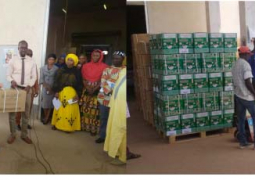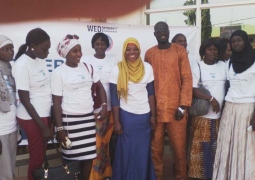The Regional Health Management team-Western of the Department of State for Health and Social Welfare in collaboration with UNICEF over the weekend embarked on a tour of ten villages in Foni in an open field day on household water treatment and management. The beneficiary villages are Sintet, Chabai, Bondali Tendali, Bwaim Dobong, Nyantempo, Bullenghat, Giffanga, Jakoi Sibiri, Brefet and Bullock.
On how households should treat water, the Senior Administrative Officer of the Regional Health Management Team (Western), Abdou Aziz Ceesay, said water is essential to life and growth and can also be a source of illness. Every year, he said, thousands of millions of people suffer from diseases caused by contaminated drinking water.
Worldwide, waterborne diseases take a heavy toll on human life and cause a great deal of suffering, especially among the young.
While safe drinking water is a basic necessity for good health, unsafe drinking water can be a significant carrier of diseases such as cholera, dysentery, watery diarrhea, trachoma, typhoid and schistosomiasis.
This, Ceesay went on, can create serious health problems in the country, and plays a significant role in the high incidence of diarrheal diseases in children under five years of age, as well as affecting child survival and development in our respective communities.
Women are primary users of water in cooking, washing and tending livestock, and often play key roles in organizing village level structures to ensure sustainability of the water and sanitation facilities.
However, men should also be involved to ensure that there is shared responsibility in maintaining safe drinking water in the community.
Sources of drinking water
"In The Gambia, most rural populations draw their drinking water from hand-dug wells which are unprotected from environmental pollution, which can be a source of water-related diseases," Ceesay observed.
However, he said, improved sources of drinking are protected wells (covered or hand-pump well), public taps and piped water (into dwelling houses, yards or plots).
The benefits of clean water, he said, are to improve the health and well-being of individuals, households and communities; protect consumers from disease-causing organisms and other harmful substances; and to improve animal health and production.
Protecting water against contamination
As people come across many practices that contaminate water at sources during transportation, storage or at the point of use, Ceesay urged individuals, families and communities to take full responsibility to make water clean safer for consumption.
He also stressed the need to be knowledgeable on basic water hygiene, and that protection should start from the source.
"Wells," Ceesay said, "can be prevented from contamination by keeping the surroundings of our wells clean, covering wells using different kinds of materials, hanging of the pails rather than putting them on the ground, construction of drains to carry waste water away from the well, and construction of animal watering troughs away from the well."
He said as the handling and management of water from collection to household level takes many different forms, good practices that make our water safe needs to be encouraged.
However, he pointed out that some of the practices that make water contaminated and unsafe should be discouraged.
"It is important that each and every household, communities and institutions ensure that their water is clean and safe for consumption," Ceesay advised, adding that hygienic practices or measures should be applied throughout collection, transportation and storage stages of getting water to your household.
In many occasions, people perform bad practices that encourage water contamination during collection, transportation and storage. Among them are putting water drawers on the ground, laundering around the water sources, watering animals near wells or water sources, and bathing near wells.
On water transportation, he said, some women put leaves and other objects that are not thoroughly cleaned in water to avoid spillage during transportation, and putting hands in drinking water.
On storage, he advised people to avoid putting roots, cola nuts and leaves in drinking water, returning leftover water into the water container, handling drinking pot with dirty hands, allowing children to play with drinking cups, using hands sand or leaves to clean water containers. He advised that water should always be covered with a lid.
On good hygienic practices when fetching water, he warned that hands must be washed first with soap; washing all collection utensils with soap and water; to cover all water collection utensils after collection and during transportation; to empty and clean the jar with water and soap; to use clean muslin cloth to sheave the water before putting it in the jar; to cover the jar with clean cloth.
Water treatment at household level
Abdou Aziz Ceesay warned that water from unreliable sources such as open wells, ponds, lakes, streams and rivers need to be treated before consumption. Such water may contain germs that can cause diseases and it is, therefore, important to treat them. The choice of processing includes boiling, filtration and chemical disinfection.
Community responsibility
Ceesay said the responsibility of communities should be key in acquiring safe water in our villages.
This can be achieved through: setting up of water management communities to ensure proper management of water sources; setting up and enforcing bye laws aimed at keeping water sources safe; and to seek advice from health workers.
Ebba Secka, the regional public health nurse, Demba Bah, the community health nurse, community health nurses Jim Jallow and Yaya Jallow, and Ms. Kumba Sabally Ceesay briefed the communities on how to manage and handle water in a more caring manner to be free from diseases.
A question and answer session followed and winners were given bowls, set of hand cleaning materials, washing basins and covered buckets.
The alkalo of Giffanga, Modou Gibba, applauded the crew for such an educative and informative initiative, pointing out that the items won will always be remembered.
He also said they have learnt new things from the sensitization exercise that will help them to improve a lot.
Alkalo Gibba appealed to the authorities to make it an annual event, so that they can refresh their knowledge.
Mariama Gibba, Mariama Bojang and Apai Jarju expressed similar sentiments.



